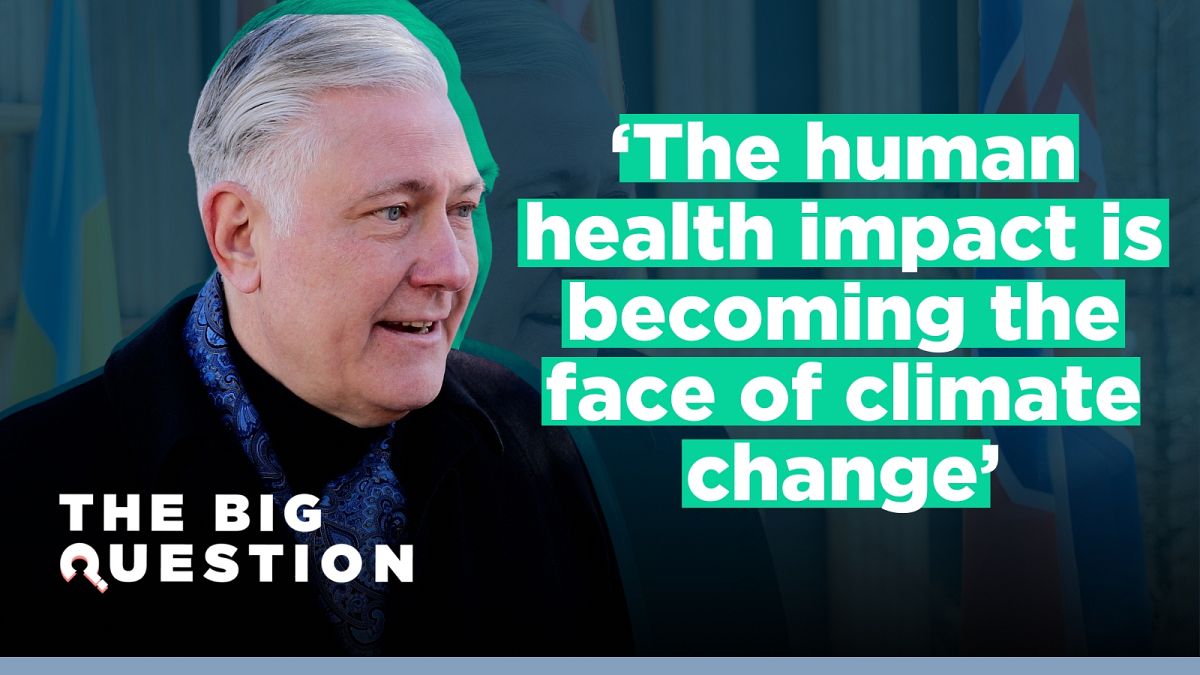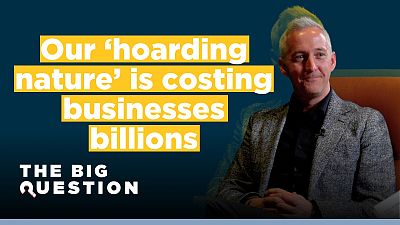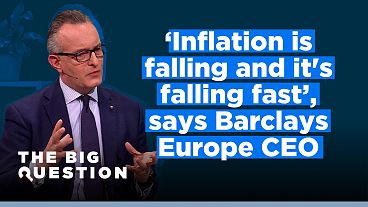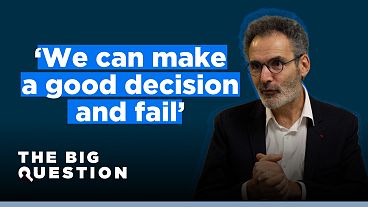If the healthcare industry was a country, it would be the fifth largest polluter on Earth.
"Hospitals are very significant polluters, despite the great benefits that we all enjoy when we fall sick," says Novartis President.
By 2050, 70% of the world's population is expected to live in cities - that equates to 2.5 billion more than today.
By then, the global temperature is likely to be at least 1.5 degrees Celsius warmer, with some sources suggesting it could be 3 degrees, depending on how drastically the world reacts.
Rising temperatures cause additional stress to the human body, but that's not the only risk to our health.
As the healthcare and pharmaceutical industries battle to stay on top of the problem - are the emissions they produce just perpetuating the problem?
In the latest episode of The Big Question, Hannah Brown spoke to Dr Lutz Hegemann, the President of Global Health and Sustainability at Novartis.
How is climate change affecting our health?
"Global warming predominantly will manifest itself with the rise and spread of vector-borne diseases that will attack patient populations that for many, many years have not lived with a disease like that," says Dr Hegemann.
Neglected Tropical Diseases (NTDs) refers to a group of around 20 diseases, including dengue fever and leprosy, which put a strain on global health but do not receive the funding or research needed to help tackle them - often because they're no longer a problem in developed countries.
However, as the earth gets warmer and extreme weather events become more prevalent, the conditions for the vectors that carry these diseases, such as mosquitoes, are becoming more favourable.
"Flooding, for instance - stagnant water is an ideal breeding ground for mosquitoes," Dr Hegemann offers as an example.
Without funding and medical intervention, Dr Hegemann fears these NTDs could become commonplace in all corners of the world and put a much greater strain on our healthcare infrastructure.
"We have to stop the neglect of neglected tropical diseases because they will rise in importance."
How polluting is the healthcare industry?
According to Dr Hegemann, the healthcare industry contributes about 5% of global greenhouse gas emissions. That includes hospitals which, despite their importance, are huge polluters.
Some 5% of global emissions is the equivalent of 514 coal-fired power plants. If the healthcare industry was a country, it would be the fifth largest polluter on Earth.
According to a study by theconversation.com in 2019, for every $1 million (€0.92 million) it generated, the pharmaceutical industry produced 48.55 tonnes of CO2 equivalent. That's 55% more than the automotive industry, which emitted 31.4 tonnes per $1m generated in the same year.
The pharmaceutical industry also relies heavily on water.
"Water quality matters a lot because we need pure water to manufacture high quality medicines," Dr Hegemann explains.
However, there is some concern over pharmaceutical chemicals making their way into our water sources, either through the improper disposal of medicines and chemicals, through poor municipal sewage management (entering the system through patient excrement) or from manufacturing waste water.
Do big pharmaceutical companies still prioritise profit over people?
Many of us, when we think of "Big Pharma", picture evil men in suits rolling in money trying to monopolise the market while the poorest in society struggle to gain access to the treatment they need. It’s not exactly a complementary image.
But is that a true and accurate depiction of the industry?
"The industry has not always acted in a way that would foster trust with the larger communities, but I think that has, to a large extent, changed," says Dr Hegemann, a former public health physician.
At the Kigali Commonwealth Conference in 2022, Novartis, one of the world’s largest pharmaceutical corporations, made a commitment to invest $250 million (€230.7 million) over a five-year period into researching and developing medicines for diseases where absolutely no market exists.
"I still believe that, as a responsible company, we have to do it because it's part of our mandate," Lutz adds.
"We've taken the decision to take the whole [sub-Saharan Africa] region out of our core business, and have a business that's almost run like a social business where we reinvest all the profits that we made into health system strengthening."
That doesn't mean the industry is perfect by any means.
In October 2023, the European Commission fined Alkaloids of Australia, Alkaloids Corporation, Boehringer, Linnea and Transo-Pharm €13.4 million (€12.4 million) for working together as a cartel to fix the minimum sales price of an pharmaceutical ingredient called SNBB.
In March 2023, Europe's largest company, Novo Nordisk was suspended from the Association of the British Pharmaceutical Industry for two years for violating rules and sponsoring a "disguised" large-scale promotional campaign.
In 2020, the US state of Washington sued Johnson & Johnson for its role in making the prescription of opioids more widespread, and for deceiving doctors and the public about the risk of addiction.
In late 2017, Novartis was under investigation in Greece for bribing state officials and doctors to gain preferential treatment in the market.
So, while in some areas, the pharmaceutical industry is making great strides, there's still some room for improvement when it comes to business ethics.
How does healthcare need to change to cope with future challenges?
Dr Hegemann notes that it's important not to forget the "tremendous strides" that have been made in containing disease over the past 20 years.
"We halved childhood mortality in sub Saharan Africa.
"HIV, Aids, when I was still practising as a physician was a death sentence, has become now a well manageable almost chronic disease," he adds.
"But then those are being threatened now by the climate change and the consequences that it has, particularly on the infectious disease."
However, Lutz insists climate change isn't the only threat and says that geopolitical activity can also have a huge effect on disease and access to healthcare.
"I think what's critically important is that we build resilient health systems, and that's predominantly investing into the primary health care, bringing the health care to the patient rather than the patient to the healthcare system."
But it's also not just down to the private sector. Dr Hegemann believes public and private partnerships are the key to improving global health and that more effort needs to be made to help people get diagnoses because, without that, what is the point in increasing efficacy and access to medicine?
Dr Hegemann also stresses the importance of changing the way we address healthcare.
"The health care system in many parts of the world, has been set up so you essentially care for those who have fallen sick.
"And I think we need to change that to look much more into measures to prevent disease from happening in the first place.
"That shift is not easy because, very often, the money is [used for] looking after the sick [...] but I believe that's the shift that, ultimately, [we] need to make and if we can deploy our resources in the most efficient way then, of course, that's going to help make that change."
The Big Question is a series from Euronews Business where we sit down with industry leaders and experts to discuss some of the most important topics on today’s agenda.
Watch the full episode above to learn more about how climate change is affecting the healthcare industry.




